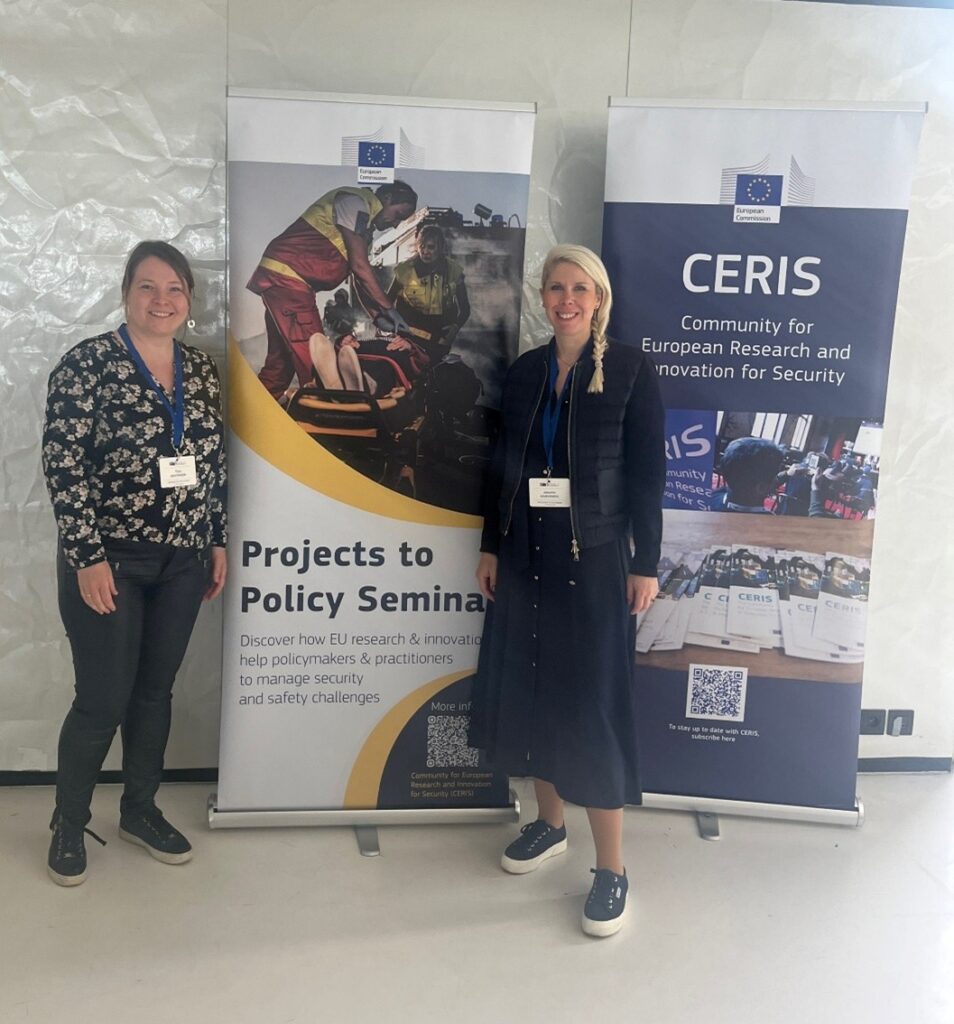EU-funded research is more than a driver of scientific progress — it can at best be a powerful tool that can influence policy makers, shaping the future of European policy and ensuring that EU policies are grounded in science and real-world needs. The annual Projects to Policy Seminar (PPS2025) was organised in June 2025 in Brussels by DG HOME and the Research Executive Agency (REA), where experts, policymakers, and researchers came together to explore how Horizon Europe funded projects (within the topic civil security for society) can influence decision-making, drive innovation, and strengthen resilience across the EU member states. The seminar provided a unique platform for discussing how EU-funded research projects can bridge the gap between knowledge and decision-making in Europe.
 Picture: Tiina Haapanen and Johanna Karvonen represented the VIGIMARE project at PPS2025 (Karvonen 2025)
Picture: Tiina Haapanen and Johanna Karvonen represented the VIGIMARE project at PPS2025 (Karvonen 2025)
In this article, I will share my insights and lessons learned from the conference, focusing on the critical role that research projects play in shaping evidence-based policies. From the importance of integrating policy priorities into project actions to the collaborative efforts among EU agencies, the seminar highlighted numerous ways in which research can drive impactful and sustainable policy solutions and how the European Commission (EC) can help projects maximise their research impact and innovation uptake. Join me as I delve into the key discussions and takeaways from this event.
The Imperative of Evidence-Based Policy Making
Nicolas Bessot from DG HOME articulated at the seminar a fundamental truth: ”Policies should be developed based on research results.” This statement is not merely aspirational but a call to action for integrating research findings into the policy-making process. He highlighted the necessity for research to address current problems with tangible operational impact. Bessot finally emphasized that understanding policy expectations is crucial, both when applying for research funding and during the project developments, as policy makers define their needs and challenges, ensuring that research is aligned with real-world issues.
Science as the Bedrock of Policy
Valeria Bricola from REA reinforced the centrality of science in EU policy making, quoting Ursula von der Leyen: ”Science holds the key to our future here in Europe.” This assertion is supported by the Horizon Europe programme, which has funded over 15,000 projects with a combined budget exceeding €43 billion (Horizon Europe programme analysis – European Commission). These projects have led to significant advancements, such as new antibiotics and AI technologies, demonstrating the tangible benefits of integrating scientific research into policy frameworks.
Collaboration and Knowledge Sharing
The seminar featured representatives from various EU agencies, including EU-LISA, Europol, CEPOL, Frontex, and EUDA, who discussed their innovation hubs and clusters focusing on AI, biometrics, and technology scanning. Aleksandrs Cepilovs from EU-LISA highlighted the importance of agency collaboration for knowledge sharing and capacity building, which is crucial for protecting internal security. This collaborative approach ensures that research findings are disseminated effectively and integrated into policy making.
Strategic Initiatives and Preparedness
Alinda Ohotski from DG HOME presented the ProtectEU strategy, emphasizing the need for resilience against hybrid threats, organized crime, and terrorism. This strategy underscores the role of research in developing new tools and solutions to enhance security. Similarly, the EU Preparedness Union Strategy, presented by Alessandro Carrotta from DG ECHO, called for a shift from reactive to proactive preparedness, highlighting the development of early warning tools and fostering resilience through partnerships.
Maximizing Research Impact
The seminar introduced the Horizon Results Booster, a service designed to maximize the impact of Horizon Europe funded projects. This initiative includes dissemination support, tailored guidance, and go-to-market support, ensuring that research findings are not only published but also utilized in policy making. Ethical considerations were also emphasized, with experts recommending the use of synthetic data and independent ethics advisory boards to ensure the integrity of research.
Funding and Innovation Uptake
Giannis Skiadaresis from DG HOME discussed various funds and strategies for innovation uptake, including the Internal Security Fund and Integrated Border Management fund. He stressed the importance of aligning innovative initiatives with strategic goals and involving end-users in the research process. This approach ensures that research projects are not only innovative but also practical and aligned with policy needs.
Conclusion
The Projects to Policy Seminar 2025 demonstrated that EU-funded research projects are crucial for effective policy making. By fostering collaboration, emphasizing preparedness and resilience, and ensuring ethical considerations, these projects can provide the evidence base needed for developing robust and impactful EU policies. The seminar also showed practical examples of how the EC can support research projects to maximise their impact and coming closer to market uptake. Finally, the seminar served as a platform for networking and finding synergies among different projects, ensuring that policy priorities are integrated into actions from the early stages. This approach is not only beneficial but essential for addressing the complex challenges facing the EU today.
References
The language editing for this text has been improved using Copilot.